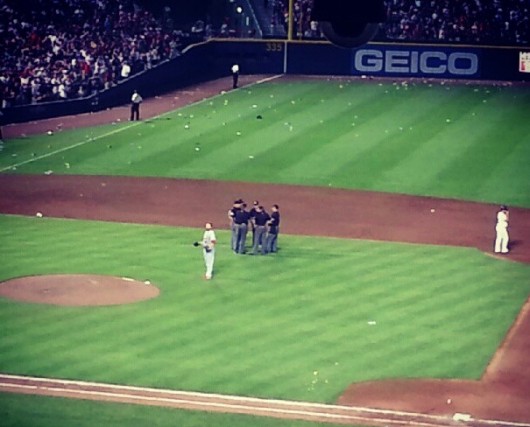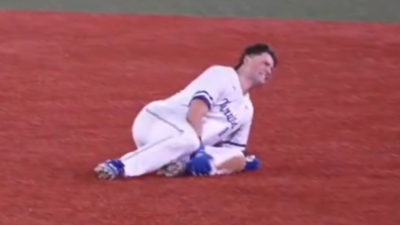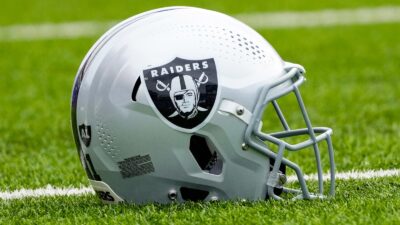 The debut of baseball’s one-game wild-card playoff format was marred by a mess that would make the NFL’s replacement refs cringe.
The debut of baseball’s one-game wild-card playoff format was marred by a mess that would make the NFL’s replacement refs cringe.
The Braves-Cardinals game Friday night was delayed in the eighth inning after Atlanta fans began littering the field with debris in protest of a call that went against their team.
With the Braves trailing 6-3 with one out and men on first and second, Atlanta’s Andrelton Simmons hit a pop fly to left that fell between Cardinals shortstop Pete Kozma and left fielder Matt Holliday. However, left field umpire Sam Holbrook called the infield fly rule right before the ball dropped — halfway out into the outfield.
Instead of bases loaded and one out, Atlanta was left with men on second and third with two outs. The fans were so upset they began littering the field with debris, causing an 18-minute delay. Braves manager Fredi Gonzalez protested the call. Atlanta’s next batter, pinch-hitter Brian McCann, walked to load the bases, but Michael Bourn struck out to end the inning, and the Braves went on to lose 6-3.
Tough way for Chipper Jones’ career to end, especially after he railed against the one-game playoff format last month. Braves fans won’t forgive the umpires for this call anytime soon.
Here’s the official definition of the rule per MLB rules:
An INFIELD FLY is a fair fly ball (not including a line drive nor an attempted bunt) which can be caught by an infielder with ordinary effort, when first and second, or first, second and third bases are occupied, before two are out. The pitcher, catcher and any outfielder who stations himself in the infield on the play shall be considered infielders for the purpose of this rule.
When it seems apparent that a batted ball will be an Infield Fly, the umpire shall immediately declare “Infield Fly” for the benefit of the runners. If the ball is near the baselines, the umpire shall declare “Infield Fly, if Fair.”
The ball is alive and runners may advance at the risk of the ball being caught, or retouch and advance after the ball is touched, the same as on any fly ball. If the hit becomes a foul ball, it is treated the same as any foul.
And here is the MLB official rule book comment on the infield fly rule:
On the infield fly rule the umpire is to rule whether the ball could ordinarily have been handled by an infielder— not by some arbitrary limitation such as the grass, or the base lines. The umpire must rule also that a ball is an infield fly, even if handled by an outfielder, if, in the umpire’s judgment, the ball could have been as easily handled by an infielder. The infield fly is in no sense to be considered an appeal play. The umpire’s judgment must govern, and the decision should be made immediately.
When an infield fly rule is called, runners may advance at their own risk. If on an infield fly rule, the infielder intentionally drops a fair ball, the ball remains in play despite the provisions of Rule 6.05 (L). The infield fly rule takes precedence.
The rule is designed to protect the team that is batting so that a savvy defensive player doesn’t intentionally drop an infield pop up with runners on in order to turn a double or triple play.
Below are a few fan photos of all the debris on the field that caused an 18-minute delay:


After the game, Braves manager Fredi Gonzalez said he felt his team had a “legit beef,” and he explained his decision to protest the call:
The Braves dropped their protest shortly after the game, and MLB explained they were standing by the umpires because the infield fly rule is a judgment call made by the umps. This will no doubt go down as one of the biggest umpiring controversies we have seen in baseball in the past few years. Here are all the others, not to mention this awful call by Sam Holbrook earlier in the season.
Photo credits: @Jonathon_Q/Twitter, @kristenmpruitt/Twitter












